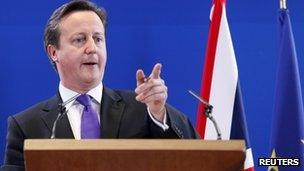David Cameron 'prepared to consider EU referendum'
- Published
- comments

Mr Cameron said the government needed 'tactical and strategic patience'
David Cameron is prepared to consider a referendum on the UK's EU relationship, but only when the time is right, <link> <caption>he has written in the Sunday Telegraph</caption> <url href="http://www.telegraph.co.uk/news/politics/david-cameron/9367479/David-Cameron-We-need-to-be-clear-about-the-best-way-of-getting-what-is-best-for-Britain.html" platform="highweb"/> </link> .
In the article, the prime minister said he wanted a "real choice" for voters but said an immediate in/out referendum was not what most wanted.
The Lib Dems said the article addressed internal Tory divisions, adding there is little public appetite for debate.
Nearly 100 Conservative MPs have called for a poll during the next Parliament.
In a letter to the prime minister, they urged him to make it a legal commitment to hold a vote on the UK's relationship with the EU.
A Liberal Democrat source said Mr Cameron was "perfectly entitled", as Tory party leader, to set out his views on a possible referendum after the 2015 general election.
But, the source said, there is little public appetite "for an abstract discussion about a referendum on an undefined question at an unspecified time in a future parliament".
William Hague: "There's too much interference, too much bureaucracy, too many decisions made at the European level"
Labour accused Mr Cameron of engaging in "party management" saying the eurozone crisis was the "big issue".
Foreign Secretary William Hague, speaking on BBC One's Andrew Marr Show, said there was "a very powerful case" for a referendum if other member states agreed a closer union following the eurozone crisis.
But, he said, the time to decide would come when it was clear how Europe would develop and how the UK's relationship with the EU could be made "better".
'More to come'
The prime minister acknowledged the need to ensure the UK's position within the European Union had "the full-hearted support of the British people" but they needed to show "tactical and strategic patience".
He disagreed "with those who say we should leave and therefore want the earliest possible in/out referendum".
"An 'in' vote too would have profound disadvantages. All further attempts at changing Britain's relationship with Europe would be met with cries that the British people had already spoken," he added.
He wrote: "There is more to come - further moves, probably further treaties - where we can take forward our interests, safeguard the single market and stay out of a federal Europe.
"Let us start to spell out in more detail the parts of our European engagement we want and those that we want to end. While we need to define with more clarity where we would like to get to, we need to show tactical and strategic patience."
Mr Cameron said, despite the eurozone crisis and his party's coalition with the Lib Dems, he would "continue to work for a different, more flexible and less onerous position for Britain within the EU".
'Real choice'
He continued: "As we get closer to the end point we will need to consider how best to get the full-hearted support of the British people, whether it is in a general election or a referendum.
"As I have said, for me the two words 'Europe' and 'referendum' can go together, particularly if we really are proposing a change in how our country is governed, but let us get the people a real choice first."
BBC political correspondent Adam Fleming said Mr Cameron was keeping his options open but he did not want a referendum "while the dust is still settling on the eurozone crisis".
Labour, rumoured to be considering making its own pledge on a referendum, may now be on the back foot, our correspondent said.
Many Conservative MPs believe Britain should renegotiate the terms of its EU membership.
Tory Eurosceptic Mark Pritchard said a referendum was needed before the next election.
"Once again, when it comes to Europe, it is always 'jam tomorrow'. But tomorrow never comes. The PM should get an Olympic sailing gold for tacking," he said.
The Liberal Democrats said existing legislation, which provides for a referendum when there is a proposal to transfer sovereignty from the UK to the EU, was "the sensible way to approach the issue of referenda".
The party added: "We understand the internal divisions in the Conservative Party that give rise to this sort of debate."
Shadow business secretary Chuka Umunna said: "On the one hand he (Mr Cameron) tells us that he's a practical Eurosceptic and very much gives a signal that he doesn't think we should be having an EU referendum at this time. Now today he's throwing chunks of meat to his disgruntled right-wing in the Tory party.
"What we actually need is a prime minister to take the right decisions for the country."
- Published28 June 2012
- Published28 June 2012
- Published7 June 2012
- Published25 October 2011